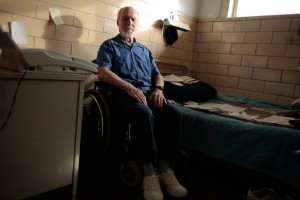Getting Old in Prison by Robert Rosso
At a federal prison in Indiana, inmate Jim Wesley Davis leaves the pill-line after drinking a small cup of crushed medication mixed in water. Approaching the chow hall for the evening meal, a guard slams the door shut and tells Davis to keep walking.
“Hey man, I just left the pill line,” Davis explains. “I haven’t eaten yet.”
“Chow halls closed,” grumbled the guard. “Next time eat first and then go pick up your dope.”
Davis reminds the guard that policy says all inmates must pick up their medication prior to each meal. Unfazed, the guard tells Davis that policy says a lot of things, but he’s still not going to eat.
Too sick to argue and just wanting to go lay down, Davis returns to his unit and goes to bed hungry.
 In 2008, Jim Davis was sentenced to both the federal Bureau of Prisons (BOP) and the Texas Department of Criminal Justice (TDCJ) under the same predicate offense. Specifically, he robbed several banks with a gun, earning him 20 years in the TDCJ and an additional 32 years in the BOP, both sentences to be run consecutively.
In 2008, Jim Davis was sentenced to both the federal Bureau of Prisons (BOP) and the Texas Department of Criminal Justice (TDCJ) under the same predicate offense. Specifically, he robbed several banks with a gun, earning him 20 years in the TDCJ and an additional 32 years in the BOP, both sentences to be run consecutively.
The recipient of a liver transplant in 2006 that took place at Baylor University Medical Center in Dallas prior to his incarceration, Davis figured that he was eligible for early parole under Texas State law. In a nutshell, Davis argued that the prison medical care system was inadequate to house a liver transplant survivor such as himself, a sentiment that was echoed by the doctor who performed his transplant, Marlon F. Levy, M.D.
“Surviving liver transplantation requires highly complex comprehensive coordinated medical care, which is daunting for the vast majority of non-transplant trained and transplant experienced physicians to deliver,” Dr. Levy wrote to the Texas Parole Board on July 18, 2008. “My sense is that that the degree of medical care available through the Texas Department of Criminal Justice is not optimal for the care of a liver transplant recipient.”
On June 6, 2011, after serving just 32-months on a 20-year sentence, Jim Wesley Davis was released on parole into the community.
“I fully expected the feds to be waiting outside the door when they released me from Huntsville,” Davis told Gorilla Convict in an face-to-face interview on August 22. “I just couldn’t believe it when they let me go home clear and free. But I assumed that they knew what they were doing.”
He assumed wrong.
Sixteen days later, US Marshals rearrested Davis and whisked him off to federal prison to begin his 32-year sentence.
Like Texas and other state prison systems, the federal prison system also has a compassionate release program, albeit one that has come under much scrutiny for its lack of use.
“Last year [former Attorney General] Eric Holder told the BOP to let at least 3,000 of us go under the compassionate release program after he changed it or revised it or whatever you call it,” Anthony Keith Green, an inmate housed in the same prison as Davis, tells Gorilla Convict. He sums up in prison-speak what steps the BOP took following Holder’s directive.
“Basically, the BOP told Holder that he wasn’t running shit and the best thing for him to do was to go suck a dick or advocate some more queer shit for a bunch of fags ,freaks and weirdos,” Green said.
In fact, the Compassionate Release program was slightly revised in 2013, one of those changes being the lowering of the age-bar. In order to be eligible, among other things, an inmate needs to be 65 or older. Also, according to a report released in May by the Justice Department Office of the Inspector general, between August 2013 and September of 2014 exactly 2 of the 348 inmates who applied for release under the revised program were released.
 Among the unlucky 348 was Jim Wesley Davis. Although Texas prison officials agreed that they were unable to adequately treat his complex medical condition, the BOP feels otherwise. According to Davis, they denied his request for compassionate released based on the assumption that he’s not 51 percent or more disabled, and because he’s not 65 or older. (He’s 64.)
Among the unlucky 348 was Jim Wesley Davis. Although Texas prison officials agreed that they were unable to adequately treat his complex medical condition, the BOP feels otherwise. According to Davis, they denied his request for compassionate released based on the assumption that he’s not 51 percent or more disabled, and because he’s not 65 or older. (He’s 64.)
“Hell man, I’ve had nine kidney infections in ten months, I’m confined to my bed nearly 16 hours a day every day, and even the prison doctor has admitted on paper that I require special care beyond his expertise,” David says. Through medical records provided to Gorilla Convict, we were able to confirm these claims.
“If I’m not a perfect candidate for this, then who is?” Davis wonders.
James Roland Clark is another federal inmate housed in the same prison as Davis who was also denied a compassionate release. A convicted bank robber serving a 30-year sentence, Clark claims that he never got into trouble with the law until he was in his 50s.
“I was a good man all my life,” Clark claims.
What exactly turned Clark into a criminal is unclear. Now 83 years old ( he is 83), according to his jailhouse lawyer, Clark suffers from extreme blood pressure fluctuations, heart problems that have landed him in and out of the hospital, and dementia.
“When they denied old man Clark a compassionate release I knew that they weren’t serious about changing anything,” the jailhouse lawyer who put together Clark’s petition told Gorilla Convict. “The guy doesn’t know where he’s at half the time, he’s gotta be costing the BOP millions of dollars a year in medical expenses, and I’ve seen his medical records and looked over his entire criminal file and I’m not even convinced the guy’s guilty. It’s a shame they can keep a guy like that in prison.”
When Gorilla Convict asked Clark if he intends to re-file for compassionate release, he looked confused and said, “I know Obama’s gonna let a lot of these black boys out. But I’m white and he ain’t gonna do it.”
Because inmates such as Clark and Davis have been denied early release in spite of the fact that they have serious medical conditions, inmate Leonard Estes tells Gorilla Convict that he wont file for a compassionate release—because he doesn’t want to give prison officials the satisfaction of denying his request.
“If they let me go blind and didn’t give a shit, then why would they let me go home now?” he reasoned.
With a “mobility stick” in his hand and a pair of dark glasses covering his eyes, Estes eagerly tells his story. Sentenced to 15 years in federal prison for being an Armed Career Criminal in 2006, Estes recalls the day at FCI Oakdale in Louisiana when he realized something with his left eye was terribly wrong.
“I was in a Vo-Tech ( Vocational Training, a sewing class to be exact) class learning how to sew, then all of a sudden I couldn’t see the line,” he says. “So I went to my boss and told her what was up and she sent me to medical.”
Initially believing that he may have been suffering from cataracts, Estes says that he realized something was all too familiar.
“The retina in my right eye became detached before because I used to box and I took too many blows to the head. That’s how I knew that the same thing was going on in my left eye,” he said.
Estes said three months would pass before an Ophthalmologist would confirm what he already knew; that the retina in his left eye was becoming detached, and he was in immediate need of emergency surgery. Yet another month would pass before the procedure was actually done, Estes said.
“The surgery was done by Doctor Broud in Baton Rouge at Lady of the Lakes Hospital and I stayed there a couple of days,” he said. “Then right before I was ready to leave, Dr. Broud comes in and tells me that I have to keep my head looking face down so my eyes could properly heal. But once they got me into the van, it was impossible.”
The officers who were escorting Estes decided to take him on a “rough ride” of sorts, taking the back roads which were dirt and gravel and marked with pot holes, he claimed.
“My retina detached on the back roads before I even made it back to the prison. The guards really fucked me up,” Estes claims.
According to Estes, Doctor Broud noticed the damage during his first follow-up appointment and reordered the surgery.
“Broud told me straight up that he thought I would end up blind because of the prison medical care,” Estes said. “And he wasn’t wrong.”
Now 61 years old, Estes claims that that he has never received any accommodations for his blindness, no brail, no special education for the seeing impaired, no nothing. “My friends lead me around most of the time, I use the stick, and learned to hold onto walls and count my steps to get around.” Additionally, he lives with another man in a tiny two-man cell that is no bigger than a mop-closet.
“I think this whole thing has been fucked up,” Estes said matter-of-factly. “I’ve been bitter and angry about it, but there isn’t much I can do.” The one thing he did do is file a Petition for Clemency, explaining President Obama his situation to President Obama and hoping for an early—”compassionate”—release.
“We’ll see what happens. If nothing else, I’ve got another three years to do, then I go,” Estes says. After giving it a little thought, he adds, “Well, I’ve been hearing that there’s a lot of changes coming in the BOP and one of the things they are talking about doing is changing the compassionate release program for real this time. So fuck, maybe if Obama denies my clemency petition I’ll file for one after all.”
Indeed, lawmakers in Washington, DC. appear poised to pass comprehensive criminal justice reform by years end. In September, the House of Representatives will vote up or down on the the Safe Justice Reinvestment Act, a bill that includes “Expanding the Ability To Apply for Compassionate Release” through the courts. Currently, inmates seeking an early release on compassionate grounds must do so at an institutional level, leaving the warden in charge of this difficult decision. Should the Safe Justice Reinvestment Act pass, the process will be left entirely to the sentencing judge.
Should Congress not pass the Safe Justice Reinvestment Act or any other legislation pertaining to sentence reform, all hope is not lost for inmates eyeing a compassionate release. According to Justice Department Inspector General Michael Horowitz , inmates aged 50 and over not only make up the fastest-growing segment of the federal prison population, but they are by far the most costly. This undisputed fact has caused Justice Department officials to come up with cost-saving solutions, one of which is to lower the age-bar for elderly inmates seeking compassionate release from 65 to 50 years old.
“Older inmates cost an average of 8 percent more to confine, but they are also less likely to end up back in prison after release,” states a DOJ report written in May.”While the recidivism rate among all prisoners is 41 percent, for those released after the age of 50, the rate falls to 15 percent.”
Aware of the DOJ report, 74-year-old convicted bank robber John Stolarz says that it’s about time. “It’s just a shame that the only reason they are considering these changes is because of money. It’s really not about being compassionate.”
Stolarz adds that he hopes the criteria for compassionate release will be changed to include all federal prisoners, not just non-violent offenders.
“Bank robbery is legally considered to be a violent crime, but in my case I didn’t hurt anybody. I had a little note and a little pocket knife. So as my health deteriorates, I wont ever be eligible no matter what.”
The truth is no one knows. As the federal deficit grows and lawmakers become less inclined to keep throwing money at a prison system that breeds recidivism, BOP officials will be forced to search for better ways to reduce the size of their population and keep incarcerated only those who deserve it most. And one such way is to expand the compassionate release program into an “emergency release system” of sorts, one that allows judges to consider an inmate’s physical and mental health, as well as their behavior behind bars.
“A person shouldn’t have to be dying or sick for a judge to show a little compassion,” said Stolarz. “They should just have to be suitable to reenter society. And a lot of guys in here are.”
If you like this check out A Dream of Clemency by Robert Rosso.



